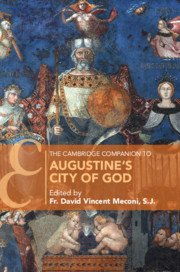Book contents
- The Cambridge Companion to Augustine’s City of God
- Cambridge Companions to Religion
- The Cambridge Companion to Augustine’s City of God
- Copyright page
- Dedication
- Contents
- Notes on Contributors
- Preface
- Abbreviations: Works by Augustine
- 1 Introduction
- 2 Book 1
- 3 Book 2
- 4 Book 3
- 5 Books 4 & 5
- 6 Books 6 & 7
- 7 Books 8–10
- 8 Books 11 & 12
- 9 Books 13 & 14
- 10 Books 15 & 16
- 11 Books 17 & 18
- 12 Book 19
- 13 Book 20
- 14 Books 21 & 22
- 15 Epilogue
- References
- Index
- References
4 - Book 3
Rome’s Woes before Christ: History and Rhetoric in The City of God
Published online by Cambridge University Press: 21 August 2021
- The Cambridge Companion to Augustine’s City of God
- Cambridge Companions to Religion
- The Cambridge Companion to Augustine’s City of God
- Copyright page
- Dedication
- Contents
- Notes on Contributors
- Preface
- Abbreviations: Works by Augustine
- 1 Introduction
- 2 Book 1
- 3 Book 2
- 4 Book 3
- 5 Books 4 & 5
- 6 Books 6 & 7
- 7 Books 8–10
- 8 Books 11 & 12
- 9 Books 13 & 14
- 10 Books 15 & 16
- 11 Books 17 & 18
- 12 Book 19
- 13 Book 20
- 14 Books 21 & 22
- 15 Epilogue
- References
- Index
- References
Summary
The complaint that the rise of Christianity had caused a series of calamities due to the neglect of the traditional polytheistic cults had already been combated by the early Latin apologists. In cataloguing catastrophes that had befallen Rome before the advent of Christ, Augustine moves on well-trodden ground, though the traditional complaint apparently had gained new force after the sack of Rome in AD 410. Accordingly, this chapter explores how Augustine adapts a traditional theme to his own apologetic purposes. It shows how he employs rhetorical pathos in order to deconstruct the idealizing view of early Roman history that had been canonized by the literary tradition and kept exerting influence on educated persons – both pagan and Christian – in his days. While he sometimes solicits an emotional response in order to reverse the traditional evaluation of a well-known event (ciu. Dei 3.14 on the Horatians and Curiatians), he is also prepared to exploit the traditional pathetic representation of the Civil Wars, available in authors like Lucan or Florus, to make his own point. His reading of Roman history as an almost uninterrupted series of civil wars reveals the distinction – conceded to the pagan adversaries in the opening chapter – between moral and external evils as artificial and marks the Roman Empire as an avatar of the ciuitas terrena, which is inevitably divided within itself. The chapters on Numa Pompilius briefly touch upon the systematically important issues of the relevance of peace for happiness and the relation of religion and philosophy and help to anchor Book 3 in the overall argument of the ciu. Dei as a whole.
- Type
- Chapter
- Information
- The Cambridge Companion to Augustine's City of God , pp. 53 - 80Publisher: Cambridge University PressPrint publication year: 2021
References
Further Reading
- 17
- Cited by



